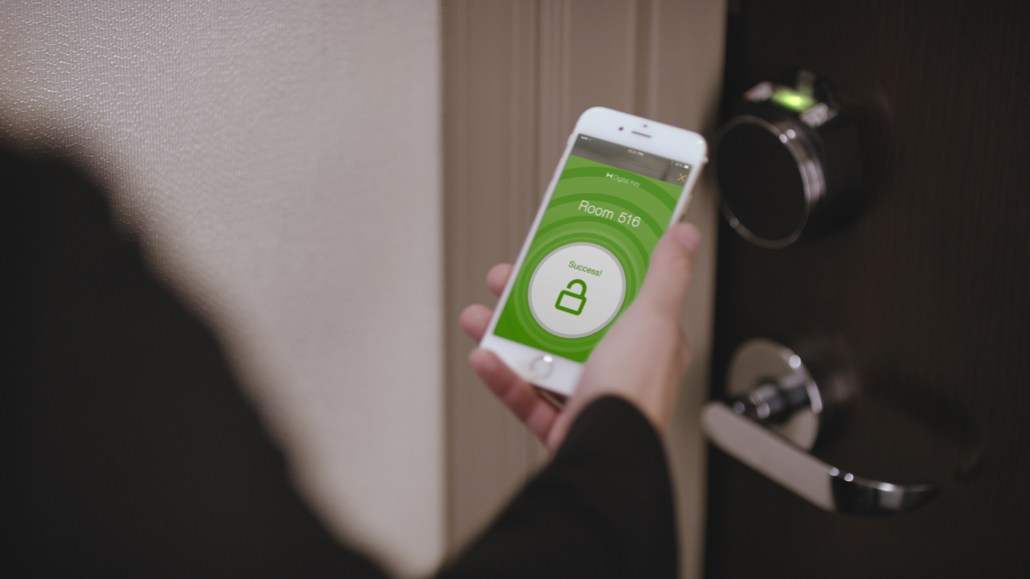Save 50% on a 3-month Digiday+ membership. Ends Dec 5.
Hilton gets 20 percent of bookings through its mobile app

At a time when app stores are crowded and brands and publishers have pulled their budgets from mobile apps, Hilton is seeing dividends.
The hotel chain’s Hilton Honors app, part of the brand’s loyalty program, is now a fundamental driver of hotel bookings. In fact, it is now bringing in 20 percent of all bookings across the company’s 14 brands, including Waldorf Astoria Hotels and Resorts, DoubleTree and Hampton, said Stuart Foster, Hilton’s vp of global marketing.
Foster believes the app, which debuted in 2014, significantly increases the brand’s ability to provide better hospitality, what he notes as Hilton’s No. 1 value across all brands. It’s what consumers really want when booking a hotel, said Foster. “We are seeing a huge explosion in the app space,” he said.
Through the app, Hilton’s 66 million members of its loyalty program can find and book rooms at more than 5,000 Hilton hotels worldwide, including straight from in-app promotions. Guests can also view their past activity, assemble their travel information, get access to free Wi-Fi and earn 500 extra Hilton Honors Points for booking from the app.
And, as of Tuesday, members can use their Hilton Honors Points to shop Amazon by linking their Amazon account to their Hilton Honors account. Hilton is the first non-credit-card brand working with Amazon to link accounts to facilitate shopping on Amazon, and it likely won’t be the last. The app advertises the partnership under its “Find Offers” button that first pops up when users open the app and links to a webpage that shows members how to get started. “Amazon Shop with Points gives our members greater flexibility with their Points,” wrote Mark Weinstein, svp and global head of customer engagement, loyalty and partnerships at Hilton, in a statement.
Hilton has also focused on implementing a “digital key” function within its app, which allows guests to use their smartphones to open their room doors, eliminating the need to check in before entering their rooms. Beyond being more convenient for guests, Foster said this feature allows employees to concentrate on guests’ experiences rather than the check-in process. “Instead of being so transactional,” he said, “we are able to come out from behind the desk and provide more hospitality.”
The feature seems to be catching on. Since the digital key technology was introduced in August 2015, there have been approximately 30 million digital check-ins, 3 million room key downloads and more than 13.6 million doors opened, according to the brand.
Ad position: web_incontent_pos1
Research firm L2 found that hotel mobile apps with multiple functions do better than those with just one purpose when it comes to rankings on the Apple App Store. The firm analyzed 311 hotel brand apps in its August “Hotels: Mobile Innovation 2017” report, finding that while 90 percent of hotel brands have their own mobile apps, only 14 percent of them ranked in the top 1,500 travel apps in the Apple App Store. Meanwhile, the Hilton Honors app and Marriott’s app were the only ones to rank in the top 30 in the travel category of the Apple App Store. The report highlights other hotel chains, like Radisson Red, Virgin Hotels and W Hotels, which, along with Hilton, have experimented with eliminating the front desk altogether, eschewing the check-in process to spend more time assisting guests in other areas.
But all this technology does not come cheap. Geraldine Calpin, Hilton’s chief marketing officer, told the Financial Times the brand spent $100 million to develop and install the digital key feature and another $550 million on “infrastructure” to make sure the technology runs through its hotel management systems. Hilton plans on expanding the digital key function to over half of its global hotels and resorts by the beginning of 2018.
While Foster would not say how much the brand has spent on the app overall, he said Hilton allocates 40 percent of its marketing budget to digital channels, which includes the Hilton Honors app. He said Hilton also updates the app at least 13 times a year, and the next update might include a way for guests to pay their bill from the app. “As we continue to evolve the app,” he said, “we will make it more intuitive and provide more conveniences for guests.”
More in Marketing

Ulta, Best Buy and Adidas dominate AI holiday shopping mentions
The brands that are seeing the biggest boost from this shift in consumer behavior are some of the biggest retailers.

U.K. retailer Boots leads brand efforts to invest in ad creative’s data layer
For media dollars to make an impact, brands need ad creative that actually hits. More CMOs are investing in pre- and post-flight measurement.
Ad position: web_bfu



